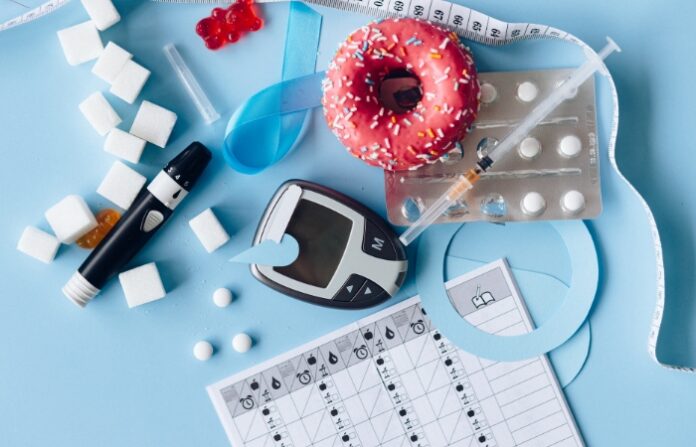Diabetes affects millions of people worldwide. Despite its widespread prevalence, there are many misconceptions about the chronic condition that can make it difficult for those who have it to manage it effectively. From misconceptions about what causes diabetes to misunderstandings about how it should be treated, these myths can lead to confusion and stigma.
In this article, we will explore the top 6 misconceptions about diabetes and provide accurate information to help debunk these myths once and for all.
Myth #1: Diabetes is mainly caused by too much sugar

While eating a lot of sugary foods can contribute to the development of type 2 diabetes, it is not the only reason a person will get it. Diabetes is a complex disease that can be influenced by a number of factors.
Your genetics, lifestyle, and other medical conditions can make you more prone to developing it than others. In fact, many people with diabetes have a family history of the condition or other risk factors that are unrelated to their diet.
Now, here’s the thing:
While sugar is not the only cause of diabetes, consuming too much of it can have a negative impact on your blood sugar levels and overall health. This makes it super important to consume it in moderation.
The Real Causes of Diabetes
Type 1 diabetes is an autoimmune condition. It happens when your body’s immune system attacks and destroys the insulin-producing cells of your pancreas. Contrary to what some people believe in, it is not caused by lifestyle factors such as diet or exercise. Plus, there is no known way to prevent it.
Type 2 diabetes, on the other hand, is a condition in which the body develops insulin resistance or fails to produce enough insulin to regulate blood sugar levels. Obesity, lack of physical activity, and a diet high in processed foods and added sugars can all contribute to this type of diabetes. Age, family history, and certain medical conditions such as polycystic ovary syndrome are also risk factors for type 2 diabetes (PCOS).
Furthermore, gestational diabetes can occur during pregnancy when the body is unable to produce enough insulin to control blood sugar levels.
This type of diabetes usually resolves after giving birth, but women who have had gestational diabetes are more likely to develop type 2 diabetes.
Myth #2: Diabetes is a contagious disease
This is probably one of the most hilarious misconceptions about diabetes. Although it is true that some people just get the disease and some do not, that doesn’t mean you can transmit the disease to another person through direct, indirect, or even sexual contact. Not only that this assumption is totally outrageous, it can also create negative stereotypes and social stigma for those people suffering from the disease.
Myth #3: Diabetic people should never eat foods with carbohydrates

The key to diabetes management is moderation so completely removing any form of carbohydrates from one’s diet is not recommended. Although it is true that carbohydrates release sugar in the blood and the reason why a diabetic person is taking insulin in the first place, we all need carbohydrates as our daily source of energy.
Whole grain foods are more recommended for diabetic people because, unlike refined products, they contain more fiber and phytonutrients that not only help in diabetes management or prevention but also decrease one’s risk of cancer and heart-related problems.
The Right Carbohydrate Intake for People With Diabetes
Carbohydrates are an important source of energy for the body, but they can also have a significant impact on blood sugar levels. For people with diabetes, managing carbohydrate intake is an important part of maintaining healthy blood sugar levels and managing the condition.
The American Diabetes Association recommends that people with diabetes aim for a balanced diet that includes a variety of foods from all food groups, including carbohydrates. Specifically, they recommend that people with diabetes consume 45-60 grams of carbohydrates per meal, or a total of 135-230 grams of carbohydrates per day.
As much as possible, choose healthy carbohydrate sources. The list includes whole grains, fruits, vegetables, and legumes as they are high in fiber, vitamins, and minerals.
Sugary drinks, candy, and white bread are examples of foods high in added sugars and refined carbohydrates. These types of food are best avoided because they can cause blood sugar levels to spike.
Myth #4: Diabetic people should stop eating sweet desserts

This one’s misleading because in order for you to know what to avoid and what to eat, you should first consult your doctor.
In some cases, a doctor will allow a person to eat moderate amounts of sweet desserts as long as the usual components of a diabetic diet are there and a sufficient amount of exercise is being done on a daily basis.
Myth #5: Diabetes Is Not Deadly
Compared to cancer, diabetes is not that notorious for claiming people’s lives. However, as soon as diabetes is not controlled or medical attention is not given to a patient, a person can actually die from various complications that can arise from this disease.
You can even get blind and be amputated if you don’t give special care to your body once you are diagnosed with diabetes.
Importance of Proper Diabetic Management
Proper diabetes management involves a combination of strategies, including regular blood sugar monitoring, taking medications as prescribed, and making healthy food choices. It should also include engaging in regular physical activity and managing stress levels.
Individuals with diabetes should collaborate closely with their healthcare team to develop a personalized management plan that takes their unique needs and preferences into account.
Myth #6: Only Overweight People Get Diabetes
While insulin therapy can help individuals with diabetes manage their condition effectively, it is not a cure for diabetes. Diabetes is a chronic condition that requires ongoing management, including regular blood sugar monitoring, medication management, and lifestyle changes.
Research into potential cures for diabetes is ongoing, but there is currently no known cure for the condition. However, proper management of diabetes can help individuals with the condition live healthy and active lives while reducing their risk of complications.
In Conclusion
Proper management of diabetes is crucial for maintaining healthy blood sugar levels, preventing or delaying complications, and improving overall health and quality of life.
By dispelling myths and misconceptions about diabetes and promoting accurate information, we can help individuals with the condition better understand and manage their health, reduce stigma and discrimination, and improve outcomes for those living with diabetes.
Sources:



















